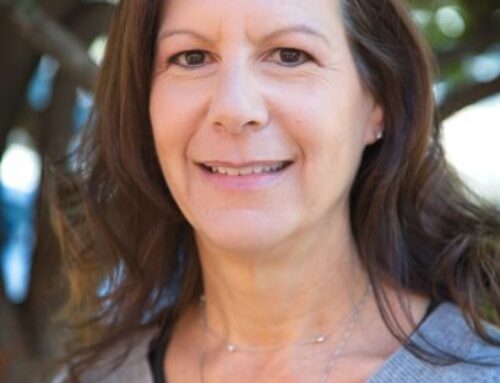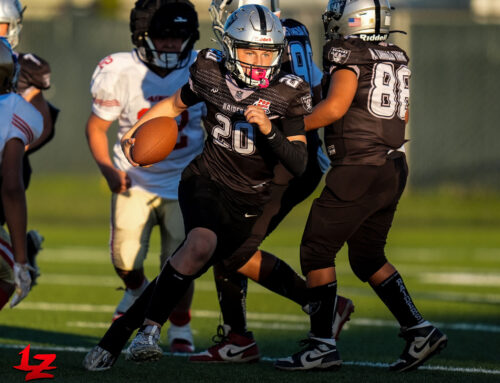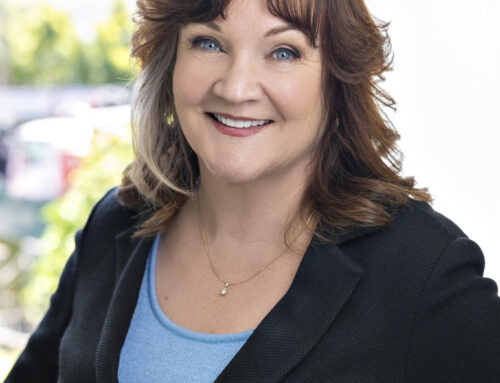While getting food every month, parents get suitable books for their kids
Published in the January 4-17, 2017 issue of Morgan Hill Life
By Marty Cheek

Photo by Marty Cheek
P.A. Walsh STEAM Academy Principal Teresa Sermersheim helps four of the school students show off books that are given to other children.
Food for young minds as well as for the body — that’s what people receive one Wednesday morning each month thanks to dedicated volunteers organized by P.A. Walsh STEAM Academy. Children in need receive two grade-appropriate books while their parents and other adults receive a box of food enough to last several meals.
“We know that when you don’t have enough to eat and you’re worried about having dinner and things like that, reading to your kids gets pushed down on the list,” said P.A. Walsh Principal Teresa Sermersheim. “And we know that they can have some food security by getting a whole big box of food and at the same time they can come over and get a couple of books. We wanted to really focus on the fact that this is for your family and you can read to your kids.”
Many of the books come from families who donate used volumes to the distribution center when their children outgrow them, she said. The school appreciates receiving good quality books of various reading levels.
“We definitely would love to get books that we can give to the families and help the families build a collection,” Sermersheim said. “It’s nice for them to have books at their homes for the kids to choose from.”
The distribution takes place in the Community Church parking lot next to the school. On the cold Wednesday morning before Christmas, “Jingle Bell Rock” played on a boom box as volunteers set up tables to be used in the distribution process. About 30 people had lined up, waiting patiently to receive their food boxes, but the delivery trucks from Second Harvest Food Bank in San Jose were late because of traffic. At each distribution, about 150 people benefit from the food boxes.
Several fourth graders involved with Girl Scout Troop 60535 had set up a table laden with fiction and non-fiction books suitable for kids. The students were learning a lesson about generosity by giving of their time to help other people, Sermersheim said.
She stressed the importance of students getting adequate nutrition to perform well academically. An empty stomach can distract from classroom focus.
“How can you be concerned whether or not you know your multiplication tables if you don’t know if you’re going to have dinner tonight,” she said. “Having enough food that will last for some days, (with the food distribution) it’s something they won’t have to worry about getting food for a while.”
The distribution is usually held the last Wednesday of the month, but because of the school’s holiday break the date was pushed up a week. The school tries to do the distribution on a regular basis because it helps people plan when they can come. Many of the people volunteering are recipients of the food distribution, Sermersheim said.
“They want to give back and they get to choose their food first,” she said. “They really want to help. So many people that I know of now who are employed but not full time, they really need to have food. They are in line very early in order to get food and they’re very appreciative. Everyone is so appreciative and kind so that it makes it a pleasant experience for all. Everyone gets thanked and feels happy.”
The quality of the food is an important consideration. Fresh food includes fruits and vegetables. Some families can’t accept perishables such as milk because they do not have refrigerators in their homes to keep dairy items from spoiling. Peanut butter is a popular item for homeless recipients.
The distribution is open to people from all schools in the Morgan Hill Unified School District, said Liz DeVargas-Almeida, a literacy intervention specialist at P.A. Walsh who helps with the program. Many volunteers and recipients come from other schools. The books give-away component of the program was added recently after DeVargas-Almeida realized many families benefit from receiving reading material. The first books were donated from a group at Saint Catherine’s Church. Now other groups as well as local residents provide children’s literature.
“We’re trying to make sure each family gets two books through the distribution,” she said. “My job is to make sure effective reading takes place in the classroom, but if they go home and don’t have any books, what good is it? So I’m trying to get the children some books — two books every distribution — so that they can practice their reading skills.”
The monthly program helps to connect people in the P.A. Walsh neighborhood, she said. People are generous and want to help others in need. And the recipients are always appreciative.
“The thank yous blow me away. At some point in the day I’ll be in tears. Not only are we feeding our (P.A. Walsh) families, but also a lot of homeless and elderly people who come through here,” she said. “We’re a community and we’ve got to stick together, so we’re helping people move on and move up.”






